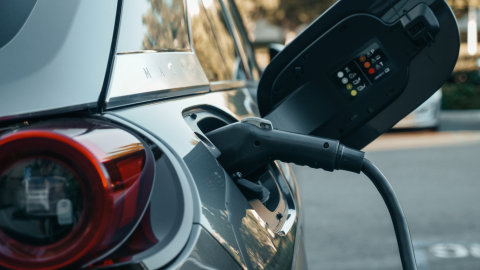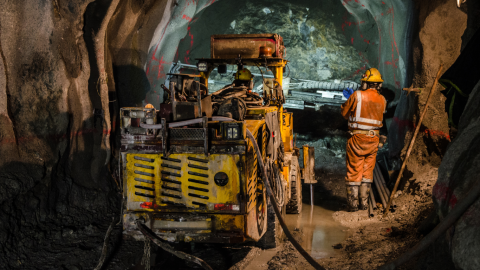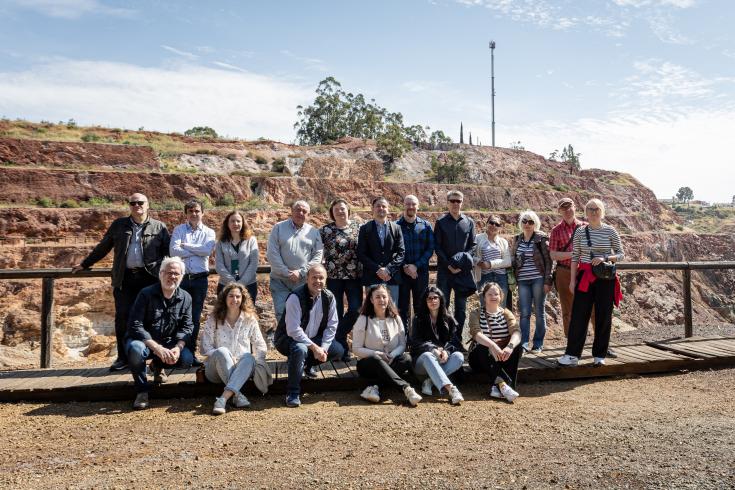EMRIE Kicks Off in Alentejo, Portugal.
Castro Verde, Portugal — 20 May 2025
On the 5th and 6th of May, EMRIE project officially launched in Portugal with a dynamic two-day kick-off meeting, bringing together partners from nine countries to begin a four-year journey toward transforming Europe’s mining regions. Hosted in the Alentejo region the meeting combined strategic discussions and a visit to the historic São Domingos mine. Against this backdrop, EMRIE marked its first step in reshaping regional policies to align with the EU Critical Raw Materials Act and build more resilient, circular, and innovation-driven ecosystems for raw materials.
The Critical Raw Materials Act as a driving force for change and innovation.
Heightened geopolitical tensions, global supply chain disruptions, and the rapid scaling of technologies such as EV vehicles, wind turbines, and semiconductors have exposed the vulnerability of European industries. As a response, the European Commission launched the Critical Raw Materials Act (CRMA) in 2024 to tackle growing concerns over Europe’s dependency on third countries for the supply of critical raw materials essential to the green and digital transitions.
The CRMA seeks to mitigate these risks by strengthening domestic production, supporting recycling and innovation, and creating resilient value chains within the Union. It sets a series of benchmarks for increasing domestic supply of critical and strategic raw materials:
- at least 10% of the EU’s annual consumption for extraction
- at least 40% of the EU’s annual consumption for processing
- at least 25% of the EU’s annual consumption for recycling
- no more than 65% of the EU’s annual consumption from a single third country
However, while the legislation is EU-wide, and the targets are to be met globally by the member states, the practical work of enabling sustainable supply chains will largely fall to regional authorities, particularly those located within geologically significant zones.

EMRIE – Powering the EU Green and Digital Transition
In this context, European regions with rich mineral resources are stepping up efforts to align themselves with the CRMA. The European Mining Regions Innovation Ecosystems (EMRIE) is part of that effort. The initiative brings together 11 partners from nine countries in a concerted effort to modernise regional policy instruments linked to land use, innovation, and mining governance.
Funded by the Interreg Europe programme, the project has a total budget of €1.89 million and adopts a structured “learning journey” approach, combining peer reviews, study visits, and regional stakeholder consultations. The aim is to transfer practical knowledge between territories and help partners adapt policies that better integrate circular economy principles, sustainable land use, and mining waste valorisation.
At the heart of EMRIE’s ambition is the improvement of six regional policy instruments — the strategies, legal frameworks, and programmes through which public authorities shape territorial development. These may involve funding mechanisms or regulatory guidance and play a decisive role in how regions manage land, stimulate innovation, and ensure environmental protection. EMRIE’s partners aim to adapt these frameworks to support the objectives of the CRMA and embed principles of circularity, sustainability, and stakeholder inclusion.

In Portugal, the Regional Land Use Plan for Alentejo will be updated to integrate circular economy and resource efficiency into spatial planning, particularly in mining areas within the Iberian Pyrite Belt, in Spain, the project will enhance the Strategy for Sustainable Mining in Andalusia by improving monitoring mechanisms, streamlining governance, and embedding CRMA-aligned goals such as waste recovery and administrative simplification.
In its turn Finland partners will focus is on the Innovation and Skills Operational Programme (2021–2027) for East and North Finland. EMRIE will help develop flagship projects to support mining circularity and interregional innovation, drawing on OECD Technical Support Instrument recommendations.
In Sweden, the Regional Development Strategy for Örebro County currently lacks dedicated focus on raw materials, despite the region’s industrial history. EMRIE will support the inclusion of a mining innovation ecosystem component aligned with national mineral policy.
In Poland, the Lower Silesian Innovation Strategy 2030 will be revised to strengthen governance and promote SME engagement in sustainable raw material use and recycling.
Lastly, in Ukraine, the Law on Environmental Policy to 2030 will serve as the entry point for introducing EU-aligned governance practices, with particular emphasis on post-coal transitions, mining rehabilitation, and environmental monitoring.
Together, these improvements aim to modernise resource governance at the regional level, unlock innovation, and ensure that mining regions can contribute meaningfully to Europe’s green and digital transitions.

